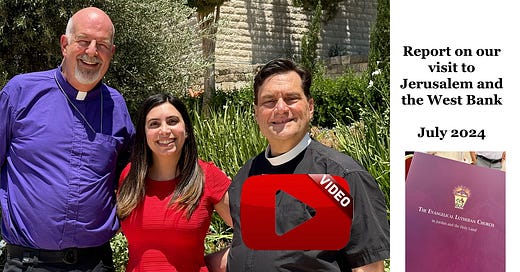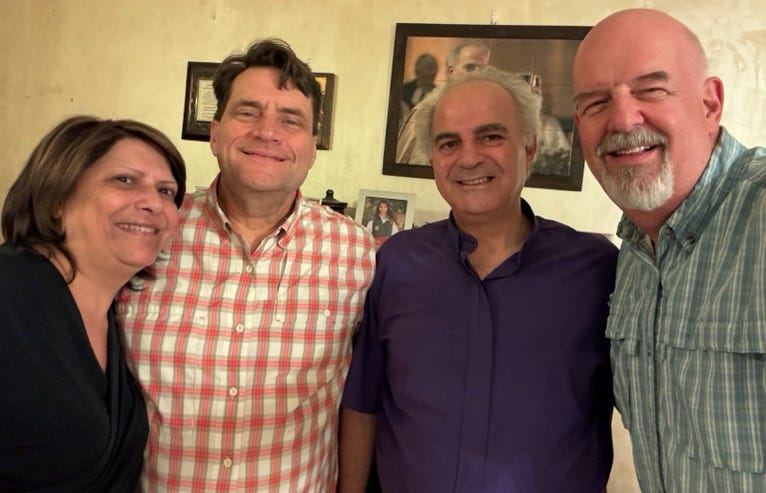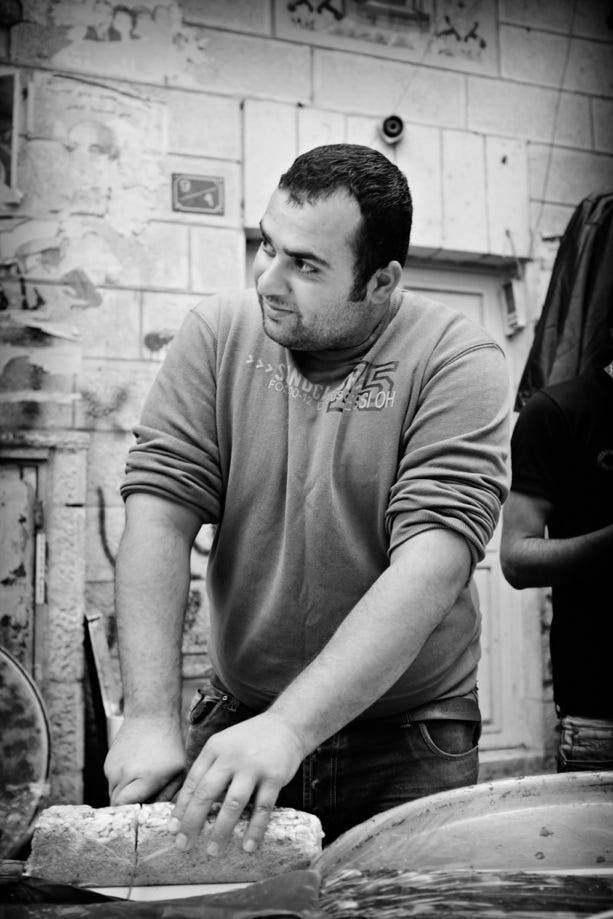As you may know, I traveled to Jerusalem and the West Bank of Israel and Palestine last week. The one-week trip was part of a solidarity trip to colleagues, friends, and partners in the Palestinian Christian community of the ELCJHL. I brought with me greetings as well as an offering (sent electronically). Many of you contributed by purchasing books this past spring, and the proceeds were included in the offering. Most of what I brought with me, along with Pastor Tim Kely, was a strong message of solidarity during these times of hardship and war. I recorded a video reflecting our relationship with the Lutheran Church in Jordan and the Holy Land. You can view it here.
However, one thing I left out of that video reflects the impact on me of the Hospitality Tim and I received. How do you describe being on the receiving end of such immense graciousness, goodwill, laughter, hard, challenging conversations, and excellent food?
What does Hospitality mean?
Most of all, love each other as if your life depended on it. Love makes up for practically anything. Be quick to give a meal to the hungry, a bed to the homeless—cheerfully. Be generous with the different things God gave you, passing them around so all get in on it: if words, let it be God’s words; if help, let it be God’s hearty help. (1 Peter 4:9 The Message).
I used to believe that Hospitality meant serving a meal, extending a handshake or hug, speaking kind words, and even cleaning the house in anticipation of a visitor. But my recent time with Palestinians in homes, offices, churches, and classrooms revealed something far more significant. Genuine hospitality is an exchange of stories, time, and, dare I say, souls.
As Dr. Stacy Jill Zackin describes, the heart of hospitality calls for a welcoming presence at the thresholds of life—the times, spaces, and pathways in which the unknown is encountered and transformation occurs. As an archetype, Hospitality facilitates the movement betwixt, between, and beyond the borders that separate the conscious from the unconscious, the Self from the other, the profane from the sacred, and the material from the imagined, as well as many other seemingly opposing forces. By honoring Hospitality and the integrity of the guest-host relationship, we can renew an individual and the collective with a spirit of welcoming and trust. We reawaken a sacred connection with one another and with the holy.
Common definitions of Hospitality
The Merriam-Webster dictionary defines Hospitality as:
Hospitality: hospitable treatment, reception, or disposition
given to generous and cordial reception of guests
promising or suggesting a generous and friendly welcome
offering a pleasant or sustaining environment 2 readily receptive: OPEN, hospitable to new ideas
The third definition's concept of openness, hospitable, adds a valuable layer to our understanding. To be open means to be porous and readily accessible to internal and external change. It’s not just being nice; it’s being altered.
Being open means being without barriers and being readily accessible.
This is the opposite of keeping up with the neighbors, ensuring your home is perfect, or having the right “stuff” on the kitchen counter.
Hospitality in Religious Traditions
Hospitality is an ancient tradition dating back thousands of years and is practiced throughout all cultures and religions. The Indian Sanskrit word closest to Hospitality is atithisatkara, centering around doing a good deed for a guest. Still, more significantly, it suggests walking with the guests wherever they may be. In the Hindu practice of worship in central India, Lawrence Babb suggests, “the entire sequence has one overall purpose: to make the god or goddess feel like a welcome guest.” In other words, worshipping the god or goddess is a form of Hospitality, and Hospitality is a form of worship.
The Bible is full of hospitality stories. Ultimately, the Bible as a whole reflects a hospitality story about God’s incredible welcome of broken people. This ancient tradition expanded with Christ as he modeled loving and welcoming all.
An early story in the Hebrew Bible (aka Old Testament) in Genesis 18 seems fitting to reiterate.
The Lord appeared again to Abraham near the oak grove belonging to Mamre. One day, Abraham was sitting at the entrance to his tent during the hottest part of the day. He looked up and noticed three men standing nearby. When he saw them, he ran to meet them and welcomed them, bowing low to the ground.
“My lord,” he said, “if it pleases you, stop here for a while. Rest in the shade of this tree while water is brought to wash your feet. And since you’ve honored your servant with this visit, let me prepare some food to refresh you before you continue on your journey.”
“All right,” they said. “Do as you have said.”
So Abraham ran back to the tent and said to Sarah, “Hurry! Get three large measures of your best flour, knead it into dough, and bake some bread.” Then Abraham ran out to the herd and chose a tender calf and gave it to his servant, who quickly prepared it. When the food was ready, Abraham took some yogurt and milk and the roasted meat, and he served it to the men. As they ate, Abraham waited on them in the shade of the trees.
Here, we find Abraham. It’s a hot day. The land is arid. The morning work is done. Now, the heat is at its blistering peak in the middle of the day. Dust is everywhere; the roads are made of dirt and are continually being used. Abraham is resting. The women are possibly resting as well. We can only imagine the dust and heat combined would make anyone want to sleep at that time of the day.
Then travelers appear. It would not have been unusual for Arab travelers to come and seek shelter as Marriott’s had yet to be built. Hospitality came from people who were camped. Abraham asked the travelers to stay. “Please, if I have found favor in your sight…” Hospitality did not just wait till someone asked for a cup of water. Hospitality was seeking how to meet needs before the need was apparent. Serving, caring for, and sheltering the stranger was an honor.
A Palestinian Rabbi from Galilee later offered these words about Hospitality.
“For I was hungry and you gave me something to eat, I was thirsty, and you gave me something to drink, I was a stranger and you invited me in, I needed clothes and you clothed me, I was sick and you looked after me, I was in prison and you came to visit me.”
Hospitality is a sacred act to treat strangers and friends, welcoming one another into our homes, communal spaces, and lives. There is a spirit of openness to being changed in the context of one's oikos – a Greek word often translated as household, suggesting the totality of all household activity. Though I’m sure you’re thinking of that creamy Greek Yogurt. Aristotle liked the word, too, and developed a much-debated concept of household management. Some 300 years later, it found a home in some New Testament writings. In that context, this word took on a broader role, encompassing neighbors, coworkers, friends, and anyone with whom you were connected.
While researching this piece, I found a purpose statement from a congregation that I’ve altered to try and capture a vision of what Oikos Hospitality might look like for modern people:
Oikos are people dwelling intentionally in relationships for a shared purpose. Oikos refers to the deep conviction that when we welcome someone into our house, we treat them like they belong—because they do belong. In a world where isolation, brokenness, and loneliness are all too common, we welcome them because we need each other. We welcome it because we are changed and altered to be more graceful, hopeful people in this act of mutual hospitality.
That happened to me over six days and nights in the West Bank and Jerusalem. In shared meals, sometimes hard conversations, telling and retelling stories, and confessing fears and hopes, I experienced a transformation. I can’t explain it entirely, but my soul has been changed.
A sacred connection reawakened within me and with a people, a land, and the divine creator who hosts this big universal Oikos where we live, move, and have our very being.
Until next time,
James Hazelwood is the author of books on the intersection of spirituality, depth psychology and everyday life. His website is www.jameshazelwood.net











Betty. Thank you very much. I am increasingly of the mind that everything is hospitality. Jim
This was a beautiful and reverent reflection on the meaning of hospitality. Thank you for sharing your thoughts, and for helping us to find a deeper meaning in hospitality.